Related Research Articles
"I Really Don't Want to Know" is a popular song written by Don Robertson (music) Howard Barnes (lyrics). The song was published in 1953.

"You Don't Know Me" is a song written by Eddy Arnold and Cindy Walker in 1955. "You Don't Know Me" was first recorded by Arnold that year and released as a single on April 21, 1956, on RCA Victor. The best-selling version of the song is by Ray Charles, who took it to number 2 on the Billboard Hot 100 chart in 1962, after releasing the song on his number 1 album Modern Sounds in Country and Western Music. The first version of the song to make the Billboard charts was by Jerry Vale in 1956, peaking at number 14 on the pop chart. Arnold's version charted two months later, released as an RCA Victor single, 47–6502, backed with "The Rockin' Mockin' Bird", which reached number 10 on the Billboard country chart. Cash Box magazine, which combined all best-selling versions at one position, included a version by Carmen McRae that never appeared in the Billboard Top 100 Sides listing.
"Here Comes My Baby" is a song written by British singer-songwriter Cat Stevens. It is well known for being an international hit for the Tremeloes in 1967.

"Misty Blue" is a song written by Bob Montgomery that has been recorded and made commercially successful by several music artists. Although Montgomery wrote the song for a different artist in mind, it was brought first to the attention of Wilma Burgess in 1966. It was recorded by Eddy Arnold the following year, both versions were top 5 Country Hits. A decade later, blues artist Dorothy Moore released the highest-charting version of the song and it reached the top ten in several different radio formats. Following Moore's revival of the track, numerous artists re-covered the tune, including country artist Billie Jo Spears. Spears's version would also go on to become a successful single release. Numerous other artists and musicians of different genres have recorded their own versions of "Misty Blue". The song is now considered both a country music and blues standard.
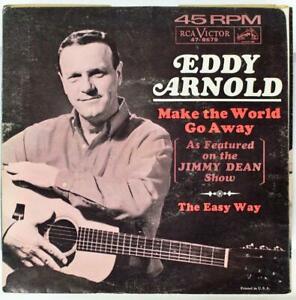
"Make the World Go Away'" is a country pop song composed by Hank Cochran. It has become a Top 40 popular success three times: for Timi Yuro (1963), Eddy Arnold (1965), and the brother-sister duo Donny and Marie Osmond (1975). The original version of the song was recorded by Ray Price in 1963. It has remained a country-crooner standard ever since.

Steve Wariner is an American country music singer, songwriter and guitarist. His discography comprises nineteen studio albums, six compilation albums, and fifty-five singles. Of his studio albums, three are certified gold by the Recording Industry Association of America (RIAA) for shipments of 500,000 copies each: 1991's I Am Ready, and Burnin' the Roadhouse Down and Two Teardrops from 1998 and 1999 respectively. I Am Ready was Wariner's first release for Arista Nashville following tenures on RCA and MCA Nashville, and Burnin' the Roadhouse Down his first for Capitol Records.

"Then You Can Tell Me Goodbye" is a song written by John D. Loudermilk. It was first released in 1962 by Don Cherry, as a country song and again as a doo-wop in 1967 by the group The Casinos on its album of the same name, and was a number 6 pop hit that year. The song has since been covered by Eddy Arnold, whose version was a number 1 country hit in 1968, and by Neal McCoy, whose version became a Top 5 country hit in 1996.

I Got a Lot of Hurtin' Done Today / I've Got My Baby on My Mind is the twenty-fourth solo studio album by American country singer Connie Smith. It was released in January 1975 and contained 11 tracks. It was also considered to be one of her "most commercially-successful" discs of the decade, according to biographer Barry Mazor. Three singles were included on the project. Both "I've Got My Baby on My Mind" and her cover of "Why Don't You Love Me" reached the top 20 of the American country songs chart. "I Got a Lot of Hurtin' Done Today" would chart in the top 40. The album itself reached the American country LP's chart in early 1975. Billboard gave the album a positive review following its release.
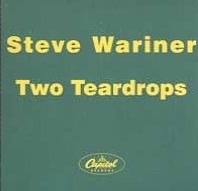
"Two Teardrops" is a song co-written and recorded by American country music artist Steve Wariner. It was released in February 1999 as the first single and title track from the album Two Teardrops. The song reached #2 on the Billboard Hot Country Singles & Tracks chart, as well as hitting #30 on the Billboard Hot 100, marking Wariner's only pop top-40 hit.
"Everything a Man Could Ever Need" is a song written by Mac Davis, and recorded by American country music artist Glen Campbell. It was released in June 1970 as the first single from his album Norwood. The song peaked at number 5 on the Billboard Hot Country Singles chart. It also reached number 1 on the RPM Country Tracks chart in Canada.
"One Small Miracle" is a song written by Bill Anderson and Steve Wariner, and recorded by American country music artist Bryan White. It was released in December 1997 as the second single from the album The Right Place. The song reached #16 on the Billboard Hot Country Singles & Tracks chart.
"How to Be a Country Star" is a song recorded by American country music group The Statler Brothers, written by group members Harold Reid and Don Reid. The song – a humorous, tongue-in-cheek advice song that names many of the top country music recording artists of the time, along with a number of classic country artists – was released in March 1979 as the first single from the album The Originals. The song eventually climbed to No. 7 on the Billboard Hot Country Singles chart that May, and also No. 18 on the Canadian RPM country singles chart.
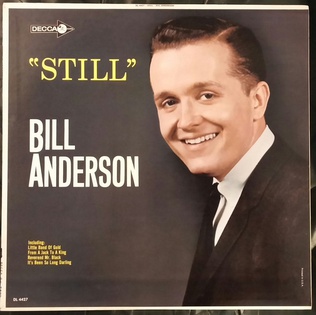
Still is a studio album by American country singer-songwriter Bill Anderson. It was released on June 17, 1963 on Decca Records and was produced by Owen Bradley. Still was Anderson's debut studio album as a recording artist after recording several singles for the Decca label. Two singles were included in the album. Its most successful was the title track, which became a crossover hit in 1963. It reached positions on the Billboard country, pop and adult contemporary charts. The album itself would also reach peak position on Billboard charts.
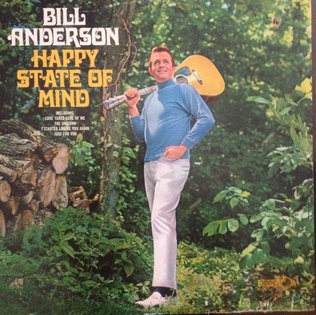
Happy State of Mind is a studio album by American country singer-songwriter Bill Anderson. It was released in September 1968 on Decca Records and was produced by Owen Bradley. Anderson's tenth studio recording, it was also his second studio album released in 1968. Among the songs included on the release was the title track, which became a major hit in both the United States and Canada.

My Life/But You Know I Love You is a studio album by American country singer-songwriter Bill Anderson. It was released in June 1969 on Decca Records and was produced by Owen Bradley. It was Anderson's eleventh studio album to be issued during his musical career. The album's title was derived from its two singles of the same names. Both singles became major hits on the Billboard country chart.
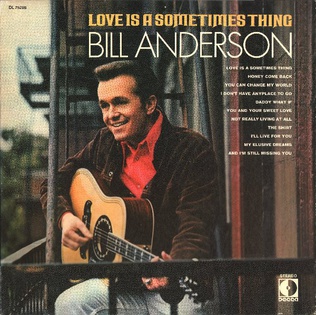
Love Is a Sometimes Thing is a studio album by American country singer-songwriter Bill Anderson. It was released in June 1970 on Decca Records and was produced by Owen Bradley. It was Anderson's fourteenth studio album since signing with the Decca label in 1958. Its only single, the title track, would become a major hit on the Billboard country chart in 1970. The album itself would also reach peak positions on the country albums chart following its release.

Fine Wine is a studio album by American country singer-songwriter Bill Anderson. It was released on August 25, 1998 via Warner Bros. Records. It was co-produced by Caryn and Steve Wariner. Fine Wine was Anderson's 36th studio album as a recording artist and his first major-label release since the 1980s. The project consisted of 11 tracks that received mixed reception from music journalists and writers.
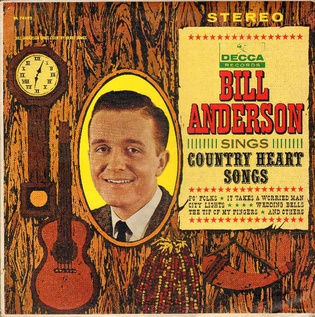
Bill Anderson Sings Country Heart Songs is a compilation album by American country singer-songwriter Bill Anderson. It was released in January 1962 on Decca Records and was produced by Owen Bradley. Despite it being a compilation, the project was Anderson's debut album release as a recording artist. It featured several of his early hits with the Decca label and included one song that would later be issued as a single in 1962.

The singles discography of American country singer-songwriter Bill Anderson contains 84 singles, three promotional singles, 6 other charted songs and four music videos. After signing to Decca Records in 1958, Anderson released a series of early singles that became hits, reaching the top ten and 20. This included "That's What It's Like to Be Lonesome" (1958), "The Tip of My Fingers" (1960) and "Po' Folks" (1961). The following year, he reached number one on the Billboard Country and Western Sides chart with "Mama Sang a Song." In 1963, Anderson released his most commercially successful single, "Still." The song was his second number one country single and his first top ten hit on the Billboard Hot 100, climbing to number eight. His follow-up single, "8×10" reached similar crossover success. Anderson released 11 more top ten country hits during the rest of the decade. This included the number one singles "I Get the Fever" (1966) and "My Life " (1969). He also had a number one hit with Jan Howard called "For Loving You" in 1968. Anderson also had top ten hits with "I Love You Drops" (1965), "Happy State of Mind" (1968) and a cover of "But You Know I Love You" (1969).

Somebody Like Me is an album by American country music singer Eddy Arnold. It was released by RCA Victor in 1966.
References
- 1 2 Whitburn, Joel (2008). Hot Country Songs 1944 to 2008. Record Research, Inc. p. 24. ISBN 978-0-89820-177-2.
- ↑ "Bill Anderson Chart History (Hot Country Songs)". Billboard.
- ↑ Whitburn, p. 94
- ↑ "Roy Clark - The Tip Of My Fingers (Vinyl, LP, Album) at Discogs". Discogs.com. Retrieved 2016-09-26.
- ↑ "Roy Clark Chart History (Hot Country Songs)". Billboard.
- ↑ "Roy Clark Chart History (Hot 100)". Billboard.
- ↑ Whitburn, p. 32
- ↑ "Eddy Arnold Chart History (Hot Country Songs)". Billboard.
- ↑ "Eddy Arnold Chart History (Hot 100)". Billboard.
- ↑ "Eddy Arnold Chart History (Adult Contemporary)". Billboard.
- ↑ "RPM Top 100 Singles - September 12, 1966" (PDF).
- ↑ Whitburn, p. 379
- ↑ "Jean Shepard Chart History (Hot Country Songs)". Billboard.
- ↑ "Top RPM Country Tracks: Issue 6559." RPM . Library and Archives Canada. October 23, 1989. Retrieved September 8, 2013.
- ↑ "RPM Top 100 Country Tracks of 1989". RPM . December 23, 1989. Retrieved September 8, 2013.
- ↑ Whitburn, p. 448
- ↑ Smith, Lisa; Hoelzle, Cyndi (January 24, 1992). "Reviews" (PDF). Gavin Report : 16.
- ↑ "Top RPM Country Tracks: Issue 2114." RPM . Library and Archives Canada. May 2, 1992. Retrieved August 15, 2013.
- ↑ "Steve Wariner Chart History (Hot Country Songs)". Billboard.
- ↑ "Best of 1992: Country Songs". Billboard . Prometheus Global Media. 1992. Retrieved August 15, 2013.
- ↑ "officialcharts.com". officialcharts.com. Retrieved July 14, 2022.